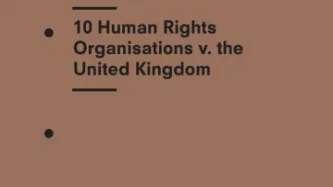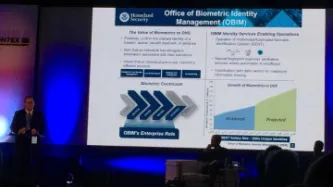Search
Content type: News & Analysis
The elections in our midst here, there, and everywhere are increasingly resulting in governments who introduce policies that result in leaps backwards for dignity, equality, civil liberties, and the rule of law. Whether it is Poland or the Philippines, governments are overriding essential safeguards.
This week Britain’s proposed surveillance legislation took another step toward normalising mass surveillance. The United States of America has long promoted mass surveillance and maintains its…
Content type: News & Analysis
For further information on timeline and case history, read this briefing.
Arguments
The argument were based on the written submissions of the parties. The oral statements summarised key points in these submissions.
The submissions can be found on PI’s website under Legal Action. In terms of today’s proceedings (these are now available through webcast)
Counsel for the UK Government, James Eadie QC started off proceedings, his opening arguments were: 1) The issues are of…
Content type: News & Analysis
From unlocking a smartphone or getting through an airport, the use of an iris, fingerprint, or your face for identity verification is already widespread, and the market for it is set to rocket. While the technology is not new, its capability and uses are. As people, biometrics offers us much, but risks ultimately only serve data-hungry industries and government agencies: in the name of efficiency and security, it has the potential to bring chaos and vulnerability.
Obtaining reliable…
Content type: News & Analysis
The United States Department of Homeland Security (DHS) has contracted one of the world’s largest arms companies to manage a huge expansion of its biometric surveillance programme.
According to a presentation seen by Privacy International, the new system, known as Homeland Advanced Recognition Technology (HART), will scoop up a whopping 180 million new biometric transactions per year by 2022.
It will replace the Automated Biometric Identification System (IDENT), which currently stores…
Content type: Advocacy
Privacy International wishes to raise serious concerns regarding the proposal to expand immigration records to include social media handles, associated identifiable information and search results. Specifically, in relation to the current request for comments Docket Number DHS 2017 0038, we object to the Department for Homeland Security proposal to update record source categories to include “publicly available information obtained from the internet”, “commercial data providers” and from “…
Content type: Advocacy
Privacy International has today submitted comments to a U.S. government consultation on whether the US Department of Homeland Security (DHS) should keep the social media details of individuals travelling to the US in so-called “Alien Files” documenting all immigrants.
We’ve urged that they don’t, and that they review and stop all similar social media surveillance by the DHS.
The systematic surveillance of social media is an increasingly dangerous trend …
Content type: News & Analysis
On 23 May 2016, the Inter-American Commission on Human Rights (IACHR) reported that severe financial problems have forced it to cancel its July and October sessions in 2016, and all trips planned for this year and, if new funding cannot be secured by 15 June 2016, will lead to the non-renewal of the contracts of 40 per cent of its staff.
Privacy International has joined PEN International, writers and other international members of the International Freedom of Expression Exchange…
Content type: News & Analysis
Should the European Union agree to legitimise trade with a country that refuses to adhere to European legal standards? This is the fundamental question that will be addressed at tomorrow’s meeting among European privacy regulators when they publish their opinion on the data-sharing agreement known as the ‘Privacy Shield’, the replacement to the failed ‘Safe Harbour’ agreement.
Background
Many of the world’s largest companies, such as Google and Facebook, store their customers’ data in…
Content type: Advocacy
Introduction
On 29 February 2016, the European Commission and the US government released the details of the proposed EU-U.S. “Privacy Shield”. The “Privacy Shield” replaces the now defunct so-called “Safe Harbor”.
The Privacy Shield is in fact a significant number of documents from various parts of the U.S. administration, which merely outline the existing, weak U.S. safeguards applicable to personal data of EU citizens. These documents are meant to serve as the basis for an “adequacy”…
Content type: Press release
A 400 gigabyte trove of internal documents belonging to surveillance company Hacking Team has been released online. Hacking team sells intrusive hacking tools that have allegedly been used by some of the most repressive regimes in the world.
The documents reportedly confirm Hacking Team has customers in 35 countries, including some that routinely abuse human rights. These documents seemingly validate research conducted by Citizen Lab…
Content type: Press release
Governments must accept they have lost the debate over the legitimacy of mass surveillance and reform their oversight of intelligence gathering, Privacy International and Amnesty International said today in a briefing published two years after Edward Snowden blew the lid on US and UK intelligence agencies’ international spying network.
“The balance of power is beginning to shift,” said Edward Snowden in an article published today in newspapers around the world. “With each court victory,…
Content type: News & Analysis
Privacy International, Bytes for All and other human rights groups are celebrating a major victory against the Five Eyes today as the UK surveillance tribunal rules that GCHQ acted unlawfully in accessing millions of private communications collected by the NSA up until December 2014.
Today’s judgement represents a monumental leap forward in efforts to make intelligence agencies such as GCHQ and NSA accountable to the millions of individuals whose privacy they have violated.
The…
Content type: Long Read
Privacy International in October 2014 made a criminal complaint to the National Cyber Crime Unit of the National Crime Agency, urging the immediate investigation of the unlawful surveillance of three Bahraini activists living in the UK by Bahraini authorities using the intrusive malware FinFisher supplied by British company Gamma.
Moosa Abd-Ali Ali, Jaafar Al Hasabi and Saeed Al-Shehabi, three pro-democracy Bahraini activists who were granted asylum in the UK, suffered variously…
Content type: News & Analysis
Last year, UK-based surveillance company Gamma TSE sold the Indonesian military US$ 6.7 million worth of equipment as part of the military's weapons modernisation effort. As early as 2005, Indonesian officials were soliciting the advice of a close partner of Gamma, Germany-based Elaman, to create technical surveillance unit (TSU), according to a white paper published as part of the WikiLeak SpyFiles and found in the Surveillance Industry Index.
Gamma and Elaman are…
Content type: News & Analysis
After two years of pressing the Government to come clean on what, if anything, they are doing to investigate the potentially illegal export of the spyware FinFisher, a ruling today by the Administrative Court in Privacy International’s favour marks a significant turning point in our long-running campaign to bring more transparency and accountability to the surveillance industry.
The High Court slammed Her Majesty’s Revenue and Customs for not disclosing whether it was investigating…
Content type: Press release
After challenging HMRC's blanket refusal to release information about the potentially unlawful export of Gamma International's FinFisher surveillance technology, the court has said that the case should proceed to trial and the grounds of Privacy International's challenge are of public importance.
Privacy International in February filed for judicial review of a decision of HMRC, the body responsible for enforcing export regulations, claiming the department is acting unlawfully in its refusal to…
Content type: Press release
The United Nations General Assembly should approve a new resolution and make clear that indiscriminate surveillance is never consistent with the right to privacy, five human rights organizations said in a November 21, 2013 letter to members of the United Nations General Assembly.
After heated negotiations, the draft resolution on digital privacy initiated by Brazil and Germany emerged on November 21 relatively undamaged, despite efforts by the …
Content type: Press release
Privacy International welcomes the resolution introduced on Friday by Germany and Brazil to the UN General Assembly, affirming the international human right to privacy and its essential nature to the realization of other rights, and condemning mass State surveillance of individuals around the world.
Should the resolution be adopted, it will be the first major statement by a UN body on privacy in 25 years, since General Comment 16 in 1988 by the Human Rights Committee. It is also the first…
Content type: Press release
A complaint filed with the Organisation for Economic Cooperation and Development (OECD) against Gamma International, a UK-based company accused of selling surveillance spyware for governments, will proceed and has been accepted for consideration, the UK National Contact Point (NCP) for the OECD announced.
The decision by the NCP is instrumental in the ongoing campaign to hold surveillance companies accountable for their products and the potential enabling of governments to commit human rights…
Content type: Press release
Privacy International, the European Center for Constitutional and Human Rights, the Bahrain Center for Human Rights, Bahrain Watch and Reporters without Borders filed formal complaints with the Organisation for Economic Cooperation and Development (OECD) in the UK and Germany against two surveillance companies on Friday 1st February. The British and German National Contact Points are being asked to investigate Gamma International and Trovicor respectively with regards to both companies’…
Content type: News & Analysis
Bloomberg reported today that security researchers have identified FinFisher spyware - "one of the world’s best-known and elusive cyber weapons" - in malicious emails sent to Bahraini pro-democracy activists, including a naturalized U.S. citizen who owns gas stations in Alabama, a London-based human rights activist and a British-born economist in Bahrain.
Analysis of the emails by CitizenLab (a project based within the University of Toronto Munk School of Global Affairs) revealed that…
Content type: Press release
The Council of the European Union today reinforced restrictive measures on EU exports to Iran, banning "exports of equipment and software intended for use in the monitoring or interception of internet and telephone communications by the Iranian authorities".
The Council also added 17 people responsible for grave human rights violations to the list of those subject to a travel ban and asset freeze. An existing ban on equipment for use in internal repression was transferred from the sanctions…
Content type: News & Analysis
Last week the German Federal Constitutional Court overturned a law on the retention of telecommunications data for law enforcement purposes, stating that it posed a "grave intrusion" to personal privacy and must be revised. In their ruling the judges found that the law stands in contradiction to the basic right of private correspondence and does not protect the principle of proportionality, as it fails to balance the need to provide security with the right to privacy. All data on telephone…














